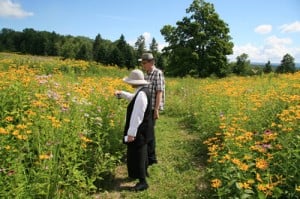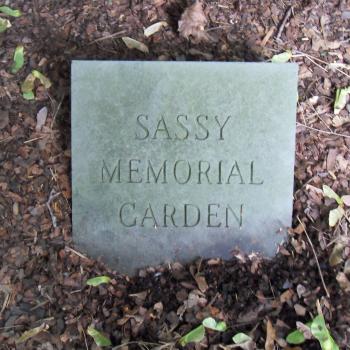 Well, I’ve reached my three score and ten years.
Well, I’ve reached my three score and ten years.
It must sound positively ancient to those of you who are half my age—or even two-thirds. I know that when I was in my thirties, forties, even fifties, seventy sounded old: not only over the hill but way down toward the bottom of the other side.
“Seventy is the sum of our years, or eighty if we are strong,” sings Psalm 90. I’m not strong. I have a chronic form of leukemia that could carry me off any day. In fact, when I was diagnosed with it just before my sixtieth birthday, my doctor said with an upbeat, encouraging voice “You can expect to live ten more years!”—which at the time sounded like a lot. So I had scientific confirmation that the psalmist’s sum of seventy years was indeed my allotment.
And just a few weeks ago, I was pretty sure my allotment had run out. I was suddenly hospitalized with a form of pneumonia that nabs bodies with compromised immune systems, like mine. After days of IV antibiotics running into each arm, I was about to phone my pastor for funeral arrangements when the antibiotics finally did their job and knocked out the pneumonia bacteria.
It was a close call, and made me more aware than ever of the wonder of each new day. I wake asking what am I doing here because each of these days now is clearly an extra, a bonus day. Each is gravy.
What am I meant to do with this gravy? Enjoy it on my mashed potatoes, yes (though in moderation: beware of too much cholesterol!). Pass it out to those who don’t have any gravy, or even potatoes, mashed or otherwise. Send favorite gravy recipes to close friends, enclosed in a note saying “I love you.” Treasure the sunshine as it turns the gravy on my plate to gold.
In this way, each gravy day passes. At least, this is how they pass now that I’m feeling pretty well. When that changes, when I start to feel sick again and the gravy gets cold and hard, will I still give thanks for it?
I pray that I will, but there’s no telling.
My husband, who’s a couple years past his three score and ten, suffers undiagnosable discomforts almost daily. His gravy is lumpy. He tries to remain grateful for it, but this isn’t easy.
Our friend Brother Anthony, a Trappist monk, nearly died of a heart ailment some years ago. When he recovered, he said to us cheerily, “Well, I’ve got a reprieve!” And isn’t that what we all have at best?
As for us mortals, our days are like grass;
we flower like the flower of the field;
the wind blows and we are gone
and our place never sees us again (Psalm 103).
It’s a beautiful image: days like grass and wildflowers look more appealing than days like gravy. Still, the truth of the psalm’s image—the wind blows and we are gone—is daunting. I’m astonished that even though every single human who ever lived has faced mortality, we’re still mystified by it.
Make us know the shortness of our life
that we may gain wisdom of heart (Psalm 90).
How does knowing the shortness of our life, recognizing our mortality, gain us wisdom?
Rowan Williams, the former Archbishop of Canterbury, suggests an answer in his rich book Christ on Trial. “Wisdom speaks through the weakness of a human life: only by accepting my own weakness, and surrendering various falsehoods that might let me think myself strong and safe, can I attune my life to that of God.”
Wisdom speaks through weakness. I can easily identify with the weakness. But I’m not so sure I hear Wisdom speaking in my ear. Maybe she’s speaking in a whisper, saying:
God’s love is everlasting
upon those who cling to his name (Psalm 103).
To believe this would surely be attuning my life to God’s. And I do believe in God’s everlasting love; I do believe in eternal life. Yet…this decidedly non-eternal life is the one I know, the one I cling to even as I also cling to God’s name, God’s love. Even as I know that these gravy days are just that: pure bonus, pure gift.
Psalm 84 addresses God:
One day within your grounds
is better than a thousand elsewhere…
For you are a sun and a shield.
Each gravy day is an extra day within God’s sun-drenched grounds, a shimmering glimpse of eternal life beyond the grave.
I won’t offend you by punning on “gravy” and “grave.” They derive from different root words, and from my earliest days as a writer I made a private vow to pun only etymologically.
Yet here we are: gravy days are numbered; all our days are numbered; we can’t avoid coming to the grave.
Right now, waiting to regain my energy after the pneumonia, I feel as if I do have one foot in the grave. My prayer is that when the time comes and this foot sinks down deeper, the other foot will stay firm on a stair that’s shimmery light, sun-drenched with promise.
Peggy Rosenthal is director of Poetry Retreats and writes widely on poetry as a spiritual resource. Her books include Praying through Poetry: Hope for Violent Times(Franciscan Media), and The Poets’ Jesus (Oxford). SeeAmazon for full list. She also teaches an online course, “Poetry as a Spiritual Practice,” through Image’s Glen Online program.











